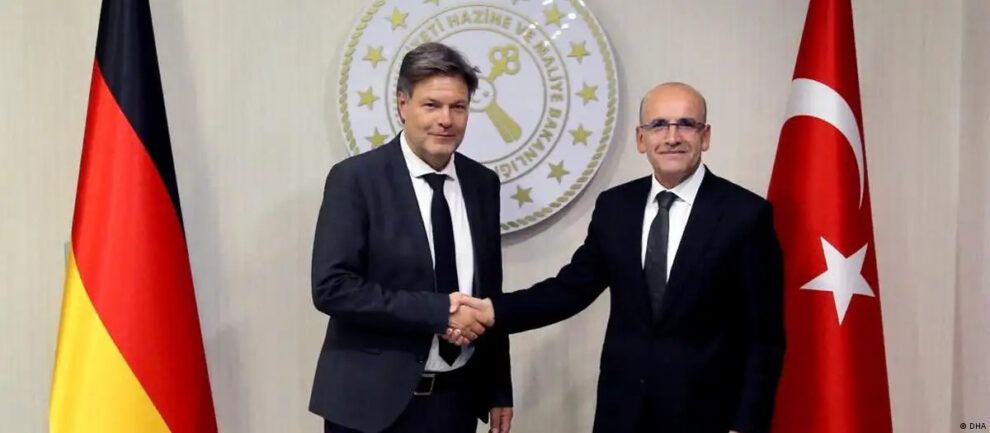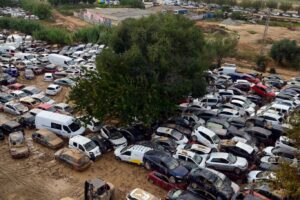Germany is Turkey’s most important trading partner and top foreign investor. As Turkish President Recep Tayyip Erdogan meets German Chancellor Olaf Scholz in Berlin, economic cooperation remains high on the agenda.
Despite countless political controversies and crises in recent years, economic ties between Germany and Turkey have been improving steadily. For years, Germany has ranked as one of Turkey’s largest trading partners and top foreign investors.
According to the German Foreign Ministry, bilateral trade between the two countries “reached a record high” of €51.6 billion ($56 billion) in 2022. Compared to the previous year, Turkish exports to Germany increased by 26.7% to €24.6 billion, and Turkish imports from Germany grew by one-third to €27 billion.
Germany remains the most important destination for Turkish exports. The Turkish Exporters’ Assembly (TIM) estimates that Turkey exported the equivalent of €14.5 billion worth of goods to Germany to the end of October this year. These goods mainly include products for the automotive industry, textiles, foodstuffs, boilers, and intermediate goods made from iron, steel, and aluminum.
Turkey mostly imports machines, vehicles, plastic products, aircraft, chemicals and medical equipment from Germany. Only Russia and China deliver more goods to Turkey than Germany.
Ayhan Zeytinoglu, president of the Istanbul-based Economic Development Foundation (IKV), said that German-Turkish economic relations were deep-rooted and crisis-proof. “Among Turkey’s largest trading partners, Germany is at the forefront. We have a remarkable trade deficit with Russia and China, yet we enjoy a balanced relationship with Germany.”
What executives want from Erdogan’s visit to Berlin
In addition to other pressing matters that Turkish President Recep Tayyip Erdogan must tend to as he visits Berlin, Turkish business representatives have also called on him to address Turkey’s customs union with the European Union. They want Germany to use its influence to push for modernization.
According to Zeytinonglu, modernizing the customs union could see trade volume double to some €90 billion. “We hope to see some steps taken during our president’s visit,” he said.
The customs union has been in place since 1995 and provides for a free exchange of goods between both countries, as well as an alignment of tariffs and regulations.
Critics calling for reform point to difficulties in consultation and dispute resolution arrangements, while Turkey has complained that visa restrictions for businesspeople and truck drivers are hindering the free movement of goods.
Exporters are also dissatisfied with the current state of affairs. Bulent Aymen is vice president of the Mediterranean Furniture, Paper and Forestry Products Exporters’ Association (AKIB). He explained that the customs union was over 25 years old and that global trade had evolved during this time. “The customs union is no longer able to satisfy the economy’s needs,” he said.
He worries that the topic will be pushed aside during Erdogan’s visit. “But it is a very urgent and important topic for the Turkish economy. I hope it will at least be brought up in Germany,” Aymen added.
How Turkey and Germany ‘need each other’
The German Chamber of Commerce Abroad (AHK) estimates that German businesses invested about €11.5 billion in Turkey between 2002 and 2022. This means that over 6% of foreign investment in Turkey is from Germany.
Over 8,000 German companies — either German-owned or with German investment — operate in Turkey, predominantly in industry, retail, logistics, and sales.
Zeytinoglu believes that Germany and Turkey need each other. “Turkey can benefit from Germany’s technological and financial strength, and Germany can profit from Turkey’s geopolitical might. Together, when it comes to the customs union, we can create new synergies,” he said.
Turkish business representatives are also calling for Turkey to have a say in EU free trade deals. Zeytinoglu called it a “great injustice” that the EU would sign free trade agreements with third countries without involving Turkey. “As a member of the customs union, we should be at the table when such agreements are made,” he said.
Because of this, Aymen said that Turkey is suffering “great losses” in foreign markets. He believes that Turkish businesses today would be far more successful in a number of countries, including South Africa and Algeria, if Turkey had been involved in free trade negotiations.
Cooperation on renewables
In addition to traditional areas of trade, new lines of business between both nations have also been emerging in recent years. Most concern the energy transition from fossil fuels to renewable sources.
In 2012, both governments launched the German-Turkish Energy Partnership, designed to allow representatives from politics, business, science, and civil society to exchange thoughts on the energy transition.
German wind turbine manufacturers such as Enercon and Nordex have large plants in Turkey.
Turkey’s economy still struggling at home
Time and again, the rhetoric of Turkey’s leadership has shaken investors’ faith in the country.
In June, Erdogan appointed Mehmet Simsek as head of the country’s economy portfolio in the hopes of curbing inflation and scoring points abroad.
Simsek is an internationally recognized financial expert and stands for a liberal market approach. He served as finance minister from 2009 to 2015, which was a relatively liberal age for the ruling AKP government.
Now, Simsek is on the road, working to restore faith in Turkey — so far, without much success, it would seem. The Turkish lira has continued to slip since the country voted for a new parliament in May. Shortly before the election, €1 cost around 21.50 Turkish lira. These days, it is over 31 lira.
At a July panel discussion in Salzburg, Austria, Simsek urged the EU to modernize the customs union. EU Commissioner for the Economy Paolo Gentiloni responded evasively, revealing how troubled relations between Europe and Turkey currently are.
There are “difficult topics” that need to be hammered out, Gentiloni said. Time would tell “if progress is possible.”
Source : DW









